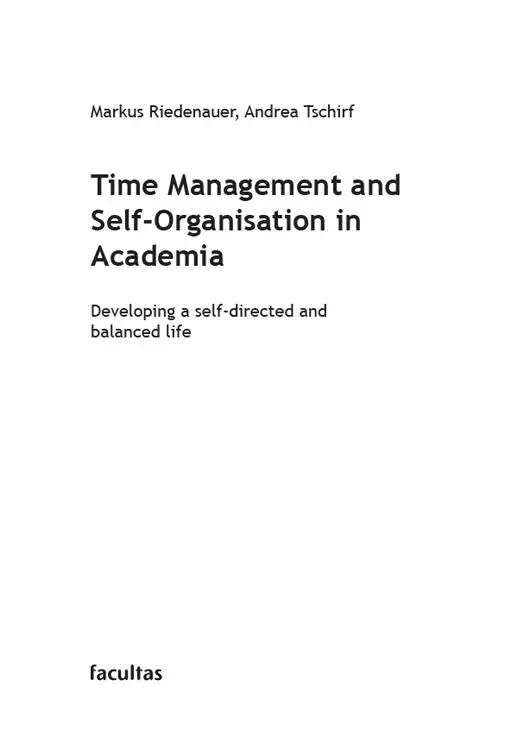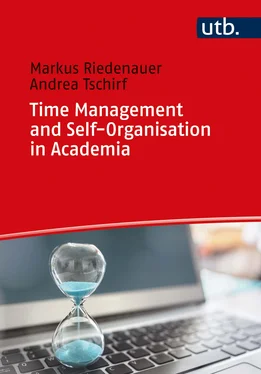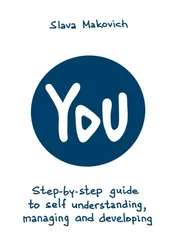Markus Riedenauer - Time Management and Self-Organisation in Academia
Здесь есть возможность читать онлайн «Markus Riedenauer - Time Management and Self-Organisation in Academia» — ознакомительный отрывок электронной книги совершенно бесплатно, а после прочтения отрывка купить полную версию. В некоторых случаях можно слушать аудио, скачать через торрент в формате fb2 и присутствует краткое содержание. Жанр: unrecognised, на английском языке. Описание произведения, (предисловие) а так же отзывы посетителей доступны на портале библиотеки ЛибКат.
- Название:Time Management and Self-Organisation in Academia
- Автор:
- Жанр:
- Год:неизвестен
- ISBN:нет данных
- Рейтинг книги:5 / 5. Голосов: 1
-
Избранное:Добавить в избранное
- Отзывы:
-
Ваша оценка:
- 100
- 1
- 2
- 3
- 4
- 5
Time Management and Self-Organisation in Academia: краткое содержание, описание и аннотация
Предлагаем к чтению аннотацию, описание, краткое содержание или предисловие (зависит от того, что написал сам автор книги «Time Management and Self-Organisation in Academia»). Если вы не нашли необходимую информацию о книге — напишите в комментариях, мы постараемся отыскать её.
Time Management and Self-Organisation in Academia — читать онлайн ознакомительный отрывок
Ниже представлен текст книги, разбитый по страницам. Система сохранения места последней прочитанной страницы, позволяет с удобством читать онлайн бесплатно книгу «Time Management and Self-Organisation in Academia», без необходимости каждый раз заново искать на чём Вы остановились. Поставьте закладку, и сможете в любой момент перейти на страницу, на которой закончили чтение.
Интервал:
Закладка:
utb 5703
Eine Arbeitsgemeinschaft der Verlage
Brill | Schöningh – Fink • Paderborn
Brill | Vandenhoeck & Ruprecht • Göttingen – Böhlau Verlag • Wien • Köln
Verlag Barbara Budrich • Opladen • Toronto
facultas • Wien
Haupt Verlag • Bern
Verlag Julius Klinkhardt • Bad Heilbrunn
Mohr Siebeck • Tübingen
Narr Francke Attempto Verlag – expert verlag • Tübingen
Ernst Reinhardt Verlag • München
transcript Verlag • Bielefeld
Verlag Eugen Ulmer • Stuttgart
UVK Verlag • München
Waxmann • Münster • New York
wbv Publikation • Bielefeld
Wochenschau Verlag • Frankfurt am Main

Bibliografische Information der Deutschen Nationalbibliothek
Die Deutsche Nationalbibliothek verzeichnet diese Publikation
in der Deutschen Nationalbibliografie;
detaillierte bibliografische Daten sind im Internet über
http://dnb.d-nb.deabrufbar.
© 2021 Facultas Verlags- und Buchhandels AG
Facultas Wien
Alle Rechte vorbehalten.
Übersetzung und Lektorat: Harold Otto
Coverabbildung: © Brian Jackson – Adobe Stock
Satz: Hannes Strobl, Satz•Grafik•Design, Neunkirchen
Druck und Bindung: CPI – Ebner & Spiegel, Ulm
UTB-Band-Nr.: 5703
ISBN 978-3-8252-5703-3
e-ISBN 978-3-8385-5703-8
epub 978-3-8463-5703-3
Content
How This Book Will Help You
I.Specific Challenges in Academic Life—Institutional Factors
II.Specific Challenges—Individual Factors
1.Knowing myself: Individual behaviour style
2.My goals, roles, and values: Basis for my orientation
3.Career planning, balance, and integration in my life
III.Managing Personal Energy—From Distress to Flow
1.Distress and eustress
2.Allocating, using, and strengthening my energies
IV.Effective Planning and Evaluation Methods
1.Principles
2.Task management
3.Priorities
4.Achieving goals
5.Planning top-down to organise the next day
6.Mastering my time thieves
7.Evaluation
8.Systems for time management
V.Order
1.Information and communication
2.Workplace and archives
VI.Time Management for the Main Fields of Academic Activity
1.Research
2.Teaching, supervision, and mentoring of students
3.Administrative and leadership tasks
4.Networking, external exchange, service, and transfer
Further Support and Literature
The Authors
How This Book Will Help You
Do you face questions such as: Can I be a successful scholar and also have a fulfilling and happy life? Do the usual time-management techniques help achieve this goal? How should these techniques be adapted in order to provide appropriate help with the very different tasks involved in research, teaching, student support, administration, and leadership? What tools can I use in a specific situation to plan the many tasks, set priorities for work, and then evaluate my progress? How can I successfully use the opportunities offered by academic freedom?
These issues emerge when facing the specific challenges in academia. Established methods of managing time and projects must be modified to prevent stress, increase motivation, and plan self-development. This involves developing some new tools. At the same time, the chosen methods must be adjusted to individual situations and personalities.
We take a holistic approach, which means that we consider possibilities that go beyond an academic lifestyle and work ethic narrowly based on the criterion of 100% career success. We make the fundamental assumption that a scholarly life can be fully satisfactory.
The challenge is that many factors influence time management: your own situation and position, personal values and behavioural preferences, private life, and much more. As a result, this book will cover many things: the specific challenges in the life of a scholar and in the cultures of various academic disciplines; the influence of individual factors resulting from the particular living situation, external conditions, work styles, and personality structure. (When it comes to the every-changing technical possibilities of the internet and the digital world, you should consult other experts offering the latest techniques.) This book will help in the fundamental questions that require reflection on one’s own life, goals, environment, interpersonal communication and cooperation skills, and ability to practically implement proven methods.
We carefully selected a range of important topics. The basic goal is to awaken an understanding of the complexity of your specific situation in academia, of the many influential factors (institutional or external and individual, i.e. internal). We offer questions, which only you can answer, and will help you to choose from the wide array of professional methods and practical ideas that you can implement. You should try them out, evaluate them at a predetermined time, and then continue to adapt them to your circumstances. Our goal is to encourage critical self-reflection and reorganisation, so that you achieve the highest possible level of self-reliance, success, and satisfaction with life.
All those working in academia can benefit from this book: the experienced professor who has just become dean, as well as the newly hired assistant with a temporary part-time contract. For example, those who still have limited experience and who struggle with a qualification requirement will benefit from the explanations on project management. The suggestions for the writers of a doctoral dissertation will also apply for people working on master’s theses.
Younger academics, however, have the advantage that their organisational practices are not yet strongly influenced by their institution’s common approach to work. This is because every organisational culture is inherently infectious and exerts pressure to adapt. If you use the relative freedom of the introductory phase to develop your own working style that fits your goals, values, personality, and living conditions, you will lay a very good foundation for your entire academic career. Especially in the empirical sciences and medicine, special situations may challenge you to customise the proposed instruments.
This book is about thoughtful and practical solutions, not about whining and complaining over suboptimal situations. On almost any issue, one could debate the policies in higher education. This debate should occur—but elsewhere. This book will help the scholar to cope and to succeed under the existing conditions.
The advice is backed by rich experience from many trainings, workshops, and individual coaching sessions at universities, especially in Austria, as well as insights from the specialised literature. Everyone can also benefit from personnel development services, at most universities, that offer training, coaching, and mentoring programmes.
Guide to this book
Key chapters are designed so that they can be read separately. Each case will refer to information from other sections that may be important for understanding or further work. Those who are primarily interested in methods can start with Chapter IV. If you are looking for support in mastering a particular scholarly challenge, you can start with the appropriate section in Chapter VI.
The first two chapters deal with the personal challenges facing scholars: first, the specific external conditions facing scholars in an academic institution ( Chapter I), then the individual factors influencing you that must be considered so that you have criteria to select, adapt, and personalise methods for yourself. Reflecting on individual behavioural preferences ( Subchapter II.1) and on the strengths and weaknesses of personal values and roles ( Subchapter II.2) will reveal crucial internal determinants for a satisfied life. In addition, Subchapter II.3identifies broader social and life circumstances that should be considered: current and hoped-for future career opportunities, income potential, as well as private plans and desires. A role analysis and longer-term planning of all areas of life make it possible to integrate professional time management into the horizon of the whole life. Self-organisation also includes careful and effective management of one’s own energies. Chapter IIIexplains how to move from distress to eustress and flow.
Читать дальшеИнтервал:
Закладка:
Похожие книги на «Time Management and Self-Organisation in Academia»
Представляем Вашему вниманию похожие книги на «Time Management and Self-Organisation in Academia» списком для выбора. Мы отобрали схожую по названию и смыслу литературу в надежде предоставить читателям больше вариантов отыскать новые, интересные, ещё непрочитанные произведения.
Обсуждение, отзывы о книге «Time Management and Self-Organisation in Academia» и просто собственные мнения читателей. Оставьте ваши комментарии, напишите, что Вы думаете о произведении, его смысле или главных героях. Укажите что конкретно понравилось, а что нет, и почему Вы так считаете.












